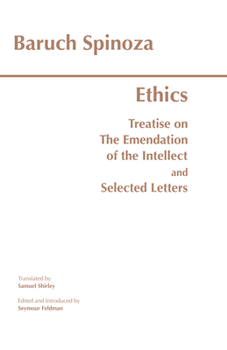Ethics: With the Treatise on the Emendation of the Intellect and Selected Letters
Select Format
Select Condition 
Book Overview
Since their publication in 1982, Samuel Shirley's translations of Spinoza's Ethics and Selected Letters have been commended for their accuracy and readability. Now with the addition of his new... This description may be from another edition of this product.
Format:Paperback
Language:English
ISBN:0872201309
ISBN13:9780872201309
Release Date:November 1992
Publisher:Hackett Publishing Company
Length:304 Pages
Weight:0.80 lbs.
Dimensions:0.6" x 5.5" x 8.5"
Customer Reviews
2 ratings
A fine translation of the Ethics.
Published by Thriftbooks.com User , 23 years ago
This volume is a fine translation of Spinoza's _Ethics_ together with some other writings that help to illuminate it -- namely, the _Treatise on the Emendation of the Intellect_ and some well-chosen passages from Spinoza's correspondence.Aside from its presentation of Samuel Shirley's clear and readable translation, this volume includes two additional helpful features. Seymour Feldman's workmanlike twenty-page introduction provides an overview of Spinoza's thought and of the main themes of the _Ethics_; and a translator's preface includes a list of twenty-four possibly confusing features of Spinoza's terminology with short explanations/clarifications. The TIE is of interest in its own right, and the items from Spinoza's correspondence are well selected to illustrate or elaborate some of the features of his more formal wriitngs.
For Spinoza Fans.
Published by Thriftbooks.com User , 25 years ago
Invaluable are the Introduction by Seymour Feldman and also, the Translator's Preface by Translator Samuel Shirley which gives lucid explanations of key Spinoza termsone of which is:From Page 23, Note 5 G-D(Deus)"Although Spinoza gives repeated warnings that his "Deus" is far from the anthropomorphic conception of God prevalent in the theology of his time, the reader will find it difficult to bear this constantly in mind. It is not until Ethics 1, Prop.14, that God, by definition, is shown to be identical with the infinite, all-inclusive, unique Substance, and thereafter it is all too easy to lose sight of this, as the religious overtones of the word "God" keep asserting themselves. So Spinoza's frequent use of the phrase "Deus sive Natura"God, or Natureis intended as a salutary corrective. For Spinoza God is all Being, all Reality, in all its aspects and in all its infinite richness."




